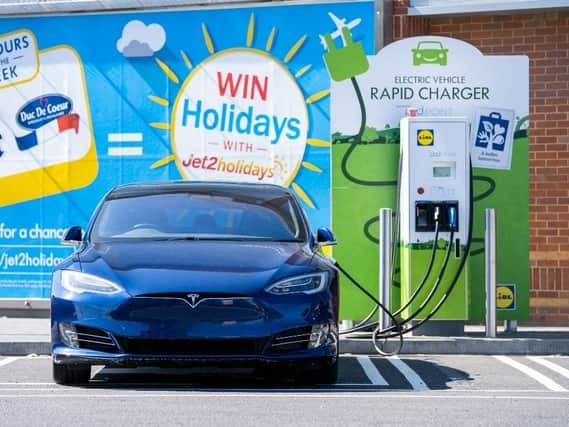Supermarket EV charging points double in two years


The number of electric vehicle (EV) charge points at supermarkets has doubled in the last two years.
Between 2017 and 2019, 542 new charger units were installed at UK supermarkets, taking their total presence to 1,115. That means that 6.5 per cent of all public charging points are located at supermarkets, according to the data from the RAC and Zap-Map.
Advertisement
Hide AdAdvertisement
Hide AdThe number of stores offering charging facilities has also doubled, with 608 supermarket sites now catering for battery electric and plug-in hybrid vehicles and an average of two chargers per site added at each new location.


The Government announced in January that it planned to move the ban on petrol, diesel and hybrid cars forward to 2035, effectively forcing drivers into EVs. The move prompted calls for a rapid expansion of the country’s public charging infrastructure to cope with the rise in EVs.
Convenient top-up
Shoppers spend an average of 45 minutes in a supermarket per visit, and those behind the research argue that supermarket chargers provide an ideal opportunity for EV drivers to top up their batteries while they shop.
Tesco currently leads the way in sheer numbers. The chain, which in 2018 signed an agreement with Volkswagen and PodPoint to install 2,400 new free-to-use chargers at 600 of it stores, has a total of 281 chargers across 142 stores and installed more than any other chain over the last two years.
Advertisement
Hide AdAdvertisement
Hide AdA quarter of all supermarket charge points are at Tesco stores. Behind it, Asda has a fifth of charging units (228) but only installed eight new ones in the last two years. However, as a proportion of its stores, Asda still leads the way, with 19 per cent, ahead of Morrisons (18 per cent) and Waitrose (14 per cent). Just four per cent of Tesco store have chargers but the researchers point out that many of its stores are urban or metro stores with no car parks.
But while Tesco and Asda lead in the total number of points, they lag behind in terms of faster charging facilities. While a 50kW rapid charger can fully charge a Nissan Leaf’s 40kWh battery in around an hour, they are relatively thin on the ground at supermarkets, with most others being 7kW chargers that take around six hours to give a full charge.
Rapid chargers could almost fully recharge a car's battery in the time it takes the average owner to complete their shopping (Photo: Shutterstock)
Currently, only 15 per cent of supermarket charge points are rapid chargers, and Morrisons leads with 84 rapid chargers - 59 per cent of its total number of chargers. Lidl, which has committed to adding rapid chargers at 300 stores by 2022, is second with 48 of its 76 units equipped with rapid charging. Asda and Tesco have just one and two rapid chargers respectively.
Advertisement
Hide AdAdvertisement
Hide AdAcross the UK the number of EV charging devices has risen from 7,986 in 2017 to 16,960 by the end of 2019.
Melanie Shufflebotham, co-founder Zap-Map, said: “It is very encouraging to see supermarkets increasingly embracing electric vehicle charging at their stores with a dramatic shift in the number of chargers being installed over the course of the last two years.
“Our research shows that while the majority of charging is done at home, most EV drivers use the public network more than once a month. While a robust rapid infrastructure across the country is essential for longer journeys, having charge points in supermarkets provides EV drivers an excellent way to ‘graze‘ energy while doing an everyday task.
“With 89 per cent of EV drivers taking the availability of charge points into account when selecting their parking, providing charging can be a real differentiator locally in the competitive supermarket sector.”
Need for more rapid chargers
Advertisement
Hide AdAdvertisement
Hide AdRAC spokesman Simon Williams said: “It is extremely positive to see the supermarkets making it easy for drivers to go electric. Having more chargers that are readily available will help to speed up the transition from petrol and diesel cars to electric ones.
“We have always said that it makes sense for people to be able to charge at supermarkets because anyone doing a full shop will inevitably spend 45 minutes in store. The UK’s big four supermarkets currently dominate fuel retailing so it will be very interesting to see if a similar battle will develop in EV charging.
“At the moment the emphasis seems to be very much on installing any form of charge point. It is our belief that as the EV market matures there will be less need for slower chargers and a greater need for higher-power ones. The introduction of more rapid chargers at supermarkets may even stimulate take-up now as it would make EVs viable for those who cannot charge at home because of where they live.”